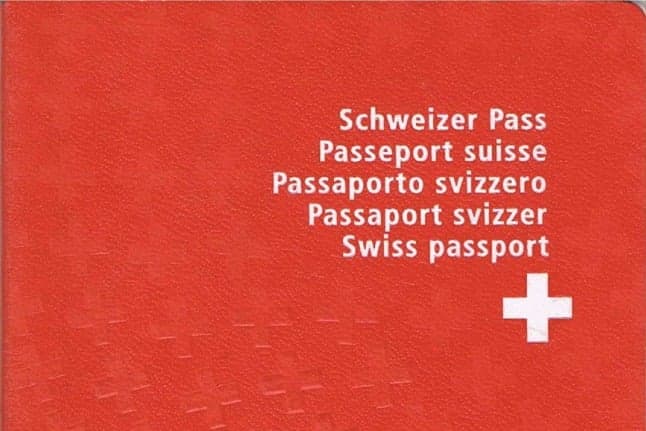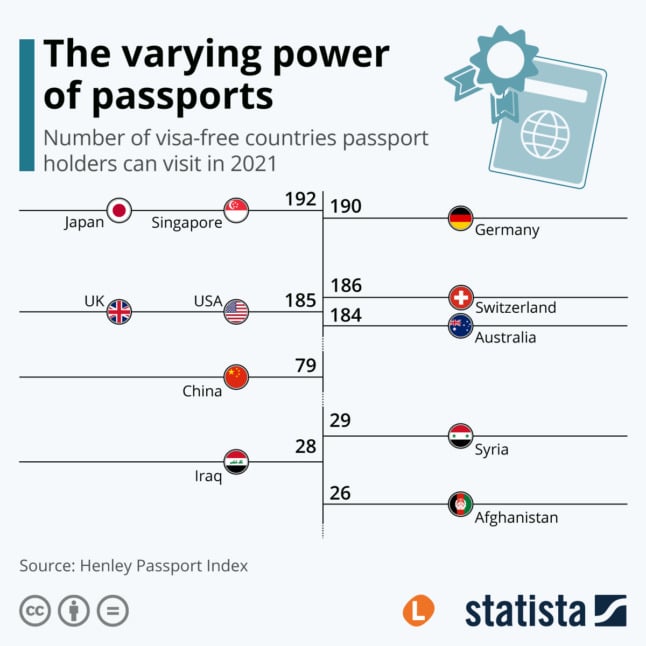How powerful is the Swiss passport?

Got a Swiss passport or thinking about getting one? This is how it stacks up compared to official travel documents of other countries.
In Switzerland, around one in four residents come from abroad. While plenty want to become Swiss, they've not done so due to the difficulty in obtaining the little red book.
In 2019, the last year for which statistics are available, just over 41,000 foreigners received their Swiss passports. This number is slightly lower than in 2017 (about 45,000) and 2018 (42,5000).
Unlike many other countries, being born in Switzerland doesn’t automatically mean the person is Swiss if their parents were born abroad and still hold foreign passports.
But anyone who has managed to get their hands on a Swiss passport should know they have one of the world's most powerful. That's according to a new study the London law firm Henley & Partners, which ranked Switzerland's passport as the equal fourth strongest worldwide.
IN NUMBERS: How many people become Swiss each year – and where do they come from?
The rankings are on the basis of the amount of visa-free countries a person holding that passport can visit (on the basis of 2021 immigration rules).
Anyone holding a Swiss passport can visit 186 countries on a visa free basis, ranking Switzerland alongside New Zealand and Belgium in sixth position.
Top place was taken out by both Japan and Singapore, who can visit 192 countries visa free.

Which country has the strongest passport? Graph prepared by Statista for The Local.
Where do other countries rank?
There are big differences in the number of countries that can be visited visa-free or with a visa-on-arrival.
Citizens of Finland, Italy, Luxembourg and Spain can visit 189 countries visa-free with their passports.
Holders of a UK and US passport can head off to 185 countries without having to figure out visa paperwork. Australians can visit 184 countries visa-free.
Austrian and Danish citizens are allowed to travel to 188 countries without an explicit entry permit.
At the other end of the scale are some passports which only allow entry to a handful of countries.
Syria, Iraq and Afghanistan have the weakest passports in terms of areas citizens can travel to without an entry permit – they have visa-free access to less than 30 countries worldwide.
How does the study work?
The law firm Henley & Partners evaluates data from the International Air Transport Association (IATA), among other factors, and provides travellers with information on which countries they can travel to with their passports and whether a visa is required.
Each passport is scored on the total number of destinations that the holder can access visa-free. For each travel destination, if no visa is required, then a score of 1 is given to that passport. This also applies if passport holders can obtain a visa on arrival, a visitor’s permit, or an electronic travel authority (ETA) upon entry.
For countries that require a visa or where a passport holder has to apply for a government-approved electronic visa (e-Visa) before departure, a score of zero is given. The same applies if they need pre-departure approval for a visa on arrival.
The country ranking, however, does not take into account the current travel restrictions resulting from the coronavirus pandemic of which there are many.
For instance Swiss passport holders – and other EU citizens – are not currently allowed to travel to Australia.
However, US president Joe Biden announced recently that the US will let vaccinated Europeans enter the country from November.
Comments
See Also
In Switzerland, around one in four residents come from abroad. While plenty want to become Swiss, they've not done so due to the difficulty in obtaining the little red book.
In 2019, the last year for which statistics are available, just over 41,000 foreigners received their Swiss passports. This number is slightly lower than in 2017 (about 45,000) and 2018 (42,5000).
Unlike many other countries, being born in Switzerland doesn’t automatically mean the person is Swiss if their parents were born abroad and still hold foreign passports.
But anyone who has managed to get their hands on a Swiss passport should know they have one of the world's most powerful. That's according to a new study the London law firm Henley & Partners, which ranked Switzerland's passport as the equal fourth strongest worldwide.
IN NUMBERS: How many people become Swiss each year – and where do they come from?
The rankings are on the basis of the amount of visa-free countries a person holding that passport can visit (on the basis of 2021 immigration rules).
Anyone holding a Swiss passport can visit 186 countries on a visa free basis, ranking Switzerland alongside New Zealand and Belgium in sixth position.
Top place was taken out by both Japan and Singapore, who can visit 192 countries visa free.

Where do other countries rank?
There are big differences in the number of countries that can be visited visa-free or with a visa-on-arrival.
Citizens of Finland, Italy, Luxembourg and Spain can visit 189 countries visa-free with their passports.
Holders of a UK and US passport can head off to 185 countries without having to figure out visa paperwork. Australians can visit 184 countries visa-free.
Austrian and Danish citizens are allowed to travel to 188 countries without an explicit entry permit.
At the other end of the scale are some passports which only allow entry to a handful of countries.
Syria, Iraq and Afghanistan have the weakest passports in terms of areas citizens can travel to without an entry permit – they have visa-free access to less than 30 countries worldwide.
How does the study work?
The law firm Henley & Partners evaluates data from the International Air Transport Association (IATA), among other factors, and provides travellers with information on which countries they can travel to with their passports and whether a visa is required.
Each passport is scored on the total number of destinations that the holder can access visa-free. For each travel destination, if no visa is required, then a score of 1 is given to that passport. This also applies if passport holders can obtain a visa on arrival, a visitor’s permit, or an electronic travel authority (ETA) upon entry.
For countries that require a visa or where a passport holder has to apply for a government-approved electronic visa (e-Visa) before departure, a score of zero is given. The same applies if they need pre-departure approval for a visa on arrival.
The country ranking, however, does not take into account the current travel restrictions resulting from the coronavirus pandemic of which there are many.
For instance Swiss passport holders – and other EU citizens – are not currently allowed to travel to Australia.
However, US president Joe Biden announced recently that the US will let vaccinated Europeans enter the country from November.
Join the conversation in our comments section below. Share your own views and experience and if you have a question or suggestion for our journalists then email us at [email protected].
Please keep comments civil, constructive and on topic – and make sure to read our terms of use before getting involved.
Please log in here to leave a comment.